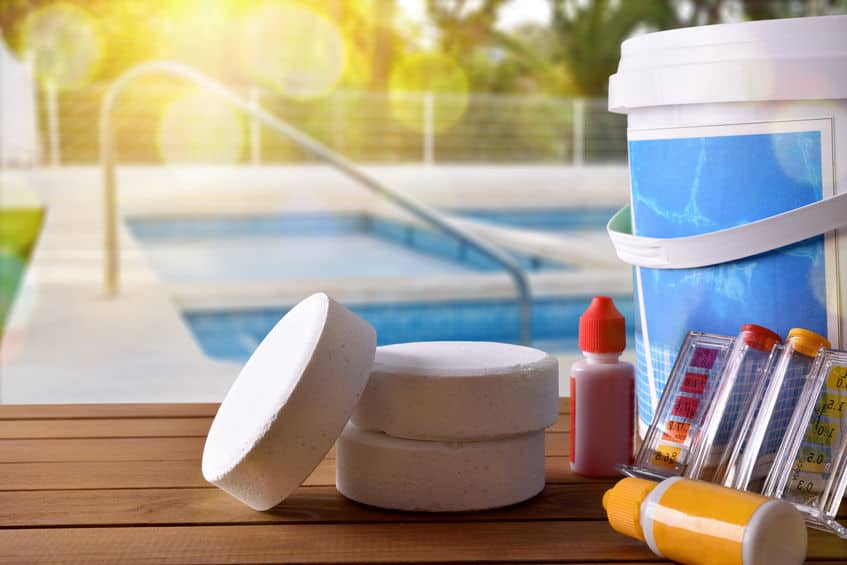Salt water pool owners need to add the same chemicals to the water from time to time that other pool owners do. In fact, we need to use an extra one called cyanuric acid (stabilizer) to help protect the chlorine produced by our chlorination system, too.
One question that pool owners have is whether to add water to chemicals or add chemicals to water. There is a specific way to add chemicals to your pool and in fact, different chemicals should be added in different ways depending on the form of the chemical – liquid, crystal or puck – and as per manufacturer instructions.
Pool chemicals should always be added to water and not the other way around. By adding chemicals to water, it ensures that if liquid splashes in your face, it’s not as potent since you’re adding a small amount of chemical to a larger amount of water. It also helps to control the concentration of fumes that may be created.
Let’s talk a bit more about pool chemicals that your salt water pool will require from time to time.
Why you should add pool chemicals to water
You should always follow manufacturer instructions regarding chemicals but adding pool chemicals to water when required is always the right order. This is opposed to adding water to chemicals. There are several reasons for this:
Fumes
Many pool chemicals such as chlorine shock create fumes and vapor when added to water. Chlorine gas is very dangerous and shock is a concentrated product. Some pool products are exothermic and release heat when combined with another one.
Pool chemicals that give off a strong odor include any chlorine or shock products and some acids that are used. You’ll see various warning labels on product packaging to warn you.
When mixing pool chemicals, it’s always best to do it outside where it’s well-vented and not inside a garage or in the home where airflow is limited and fumes can concentrate.
Burns
Science Direct produced research describing the potential of chemical burns with pool products such as shock, when the product is used incorrectly.
Pool chemicals have various warning labels on them indicating certain dangers. Pool chemicals can be corrosive (shock), poison (chlorine tablets) or flammable (antifreeze, for pipe winterization) among others.
Care must be taken when handling and using these chemicals as touching your skin or rubbing your eyes after use can be very harmful.
Misuse
Many powder products clump up and coagulate when you mix them incorrectly. Adding powder crystals to water helps them mix better. When you take a bucket that only has crystal powder in the bottom and then quickly add water, the powder can clump up.
Then you have to figure out how to mix the slurry manually together which increases the chance of a splash up of the chemical that may injure you.
Plus, if you add too much chemical in the bucket and then add water, you’ve wasted some of the chemical. It’s like the old saying: Once the toothpaste is out of the tube, it’s hard to get it back in.
Once a chemical is wet, you’re not getting it back. When you add chemical to water, you can easily add more chemical if needed but once it’s been mixed with something else, it can’t be put back in the container.
Tips on handling pool chlorine for your salt water pool
Salt water pool owners might be surprised at first to know that they will need to use chemical chlorine at some points. You typically use chemical chlorine when opening the pool to start the build up of chlorine in the water.
You may use a shock product during very hot periods of summer when pool usage is high. You may also use chlorine when closing the pool to give it a bump up for the winter in case mild temperatures occur in the early autumn, to avoid algae growth.
Salt water pool owners may be further surprised to learn that their pool is in fact a chlorine pool. Your salt chlorinator converts salt to liquid chlorine, albeit a somewhat cleaner version than a chemical one and without the strong chlorine smell and feeling in our eyes. But it’s still a chlorine pool.
So learning how to handle chemical chlorine safely is something even salt water pool owners need to know.
Chlorine crystals are concentrated and it’s often recommended to take a bucket of water and add the required chlorine crystals to the water and mix it to create a slurry. This enables the chlorine to dissolve before you dump the bucket of slurry into your pool.
Chemical chlorine products are often labeled as stabilized chlorine which means it has cyanuric acid added to it or unstabilized chlorine which means it contains no cyanuric acid.
Direct sunlight kills chlorine quickly so stabilizer is like a sunscreen that protects chlorine from being killed off prematurely.
So when you handle chlorine crystals, it may be a product that in and of itself contains several chemicals, increasing the importance of safe use and storage.
Summary
Salt water pools generally use the same chemicals as other pools so it’s best to get to know the ones that will help your pool water remain crystal clear. A big part of pool chemical usage is learning to use and store it correctly and safely since they tend to be sold in buckets that may last you several pool seasons.
If you’re interested to learn more about how you can reduce chemical usage in your salt water pool while saving some money at the same time, check out my article called Can You Use Baking Soda In Your Salt Water Pool.
You might be interested to know how this common household item can help your pool while reducing chemical usage especially when you find out that the commercial product it replaces is largely made of baking soda but at a higher price.

